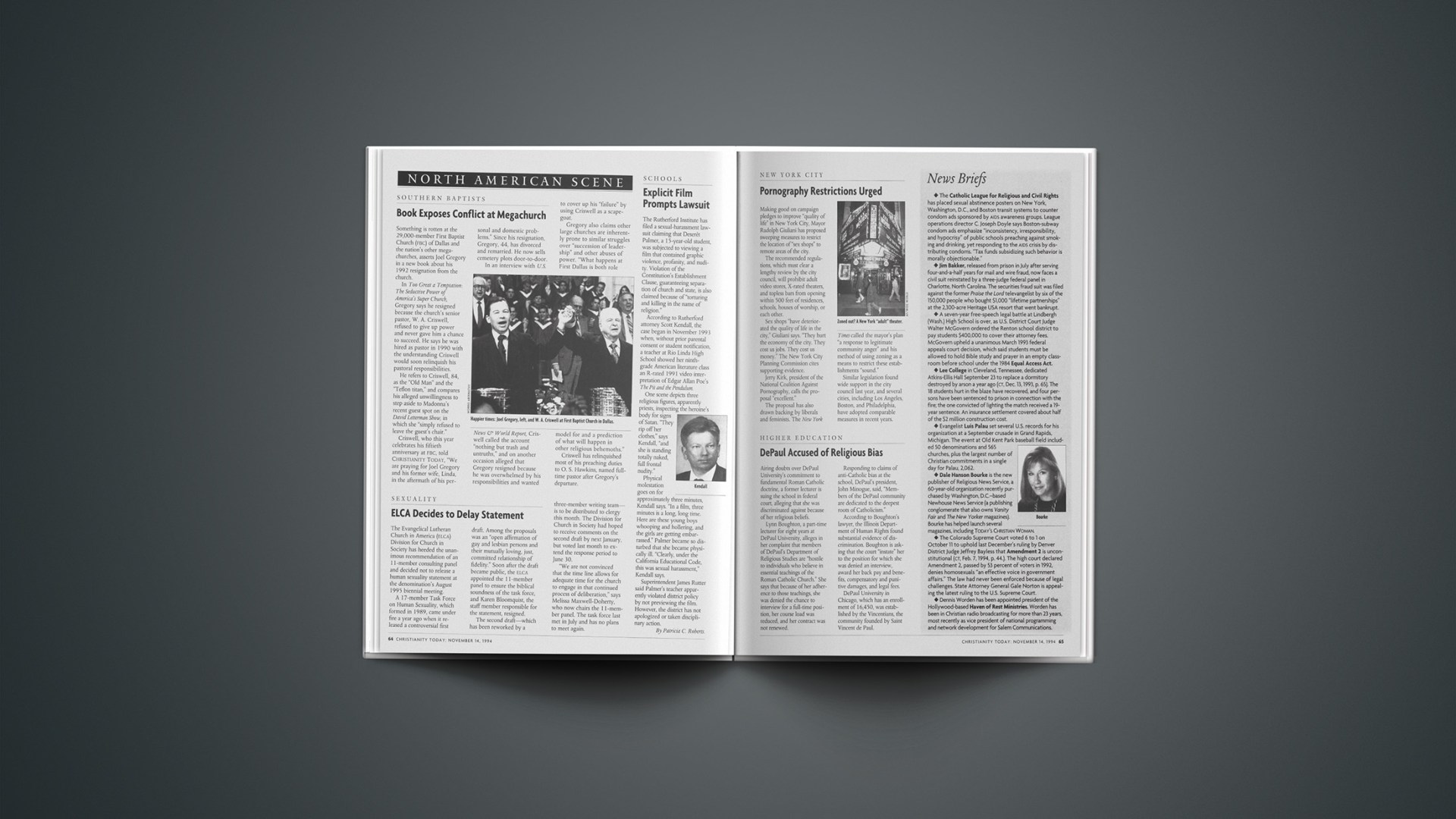Financial problems and an insufficient number of qualified faculty have led the state of New York to order The King's College in Briarcliff Manor to close on December 30. The 58-year-old institution, whose first president was radio evangelist Percy B. Crawford and second president was The King's Hour radio personality Robert A. Cook, has no option but to comply.
"The New York State Board of Regents, as an accrediting body recognized by the federal Department of Education, has the authority to say, 'You can no longer call yourself a college,' " Friedhelm K. Radandt, the college's third and current president told CHRISTIANITY TODAY. "It's the only state where that's true."
The 172 students enrolled for the fall semester (down from a high of 862 in 1980) will transfer to other colleges. Those who are within 30 credit hours of graduation will still receive a King's degree, although there will be no official graduation ceremony.
"I feel like a close friend of mine has been on life support for years and has now died," says Dan Preston, who came as a student in 1961 and still lives in the area.
FINANCIAL AND PROPERTY WOES
Life-threatening problems for the institution came to a head in March when the state said it would not allow programs to continue because of financial difficulties. King's appealed the decision, but the state education commissioner upheld it in a September 23 ruling. The action "requires the college to cease all operations at the end of the fall semester and to refrain from enrolling students for the spring," says Gail L. K. Cashen, director of the state Division of College and University Evaluation.
College leadership had hoped the crisis could be averted by a relocation 32 miles west (CT, Dec. 12, 1993, p. 60). In 1992, King's signed a contract to sell the 83-acre hilltop campus overlooking the Hudson River to an Irish-American association that wanted to create an athletics and cultural center. The village's lengthy and ongoing review of the project delayed the sale and worsened the school's dire financial condition.
The contracted $14 million purchase price, along with restructuring the $22 million debt, could have kept the school alive, according to school officials. Students and faculty regularly prayed for and anticipated the relocation.
Most observers agree that financial difficulties are at the center of the school's demise. The sequence of events that led to the current crisis is more difficult to interpret. Friends and critics differ on the centrality or interpretation that should be given to each issue, and to the causes of the steady enrollment decline that began in the mid-1980s:
* FACILITIES. The current campus is a former resort hotel built in 1908. It demanded major, ongoing maintenance from the time The King's College moved to Briarcliff Manor from Delaware in 1955.
"King's never really got itself in shape with cost-effective facilities," says Ron Strumbeck, a former trustee and director of development. In 1989, financial circumstances prompted the Middle States Association of Colleges and Schools to issue a "show cause" order as to why accreditation should not be removed.
* FACULTY. Westchester County, as a wealthy suburb, often makes the top-ten ranking in national cost-of-living surveys. "Typically 70 to 80 percent of a college's income, including that of King's, has to go to salaries and benefits," says Strumbeck. Thus King's faced an increasingly precarious job of recruiting and supporting an adequate number of qualified faculty.
* COMPETITION. Other Christian colleges weathered financial difficulty more successfully. Biology professor Wayne Frair, at King's since 1955, expressed regret that the college had not kept pace with the endowments and bequests given to other schools.
* MORAL ISSUES. One of the more significant causes of enrollment loss was a theological broadening. "Liberalism was creeping onto campus on a very large scale," says Glen VanHeemst, acting vice president from 1980 to 1991. The most visible expression was on moral issues. For example, Robert Speight, campus pastor from 1979 to 1984, says, "There were faculty who wanted to present a prochoice position [on abortion] as a viable Christian alternative." Former student Tim Mercaldo says, "A small handful of faculty sought to expose students to the view that homosexuality should be accepted as an evangelical lifestyle." Board chairman Paul Anderson says, "There were those on the faculty who did not adhere to the standards of the school."
* LEADERSHIP. Much-loved president Bob Cook did not fully resolve the on-campus tensions before he retired at age 71. "Dr. Cook was so involved in radio that the school was somewhat neglected," says Paul Neuman, acting director of communications. "The broadcast income didn't usually directly benefit the school." As a result, Radandt inherited a number of problems when he came in 1985, including what developed into standoff issues between the board and certain faculty. Attempts to address these trends swirled Radandt in controversy, resulting in the departure of many who disagreed with him (CT, Aug. 16, 1993, p. 48). Current students and faculty generally admire Radandt's leadership style and spiritual integrity.
What of the future? "The Commissioner of Education gave us a ray of hope by not taking away the school's charter," says Joyce Anderson, vice president of academic affairs. "Action to date does not preclude the college's opening again." Tentative discussions include a new King's in Manhattan or upstate New York.
Paul Anderson says King's will continue as a corporate entity, with the intention of honoring, upon completion of the property sale, financial obligations. "Our conviction is that the sale will take place."
"Just because God calls us doesn't mean there are no obstacles," Radandt says. "Out of defeat can come new life."
Copyright © 1994 Christianity Today. Click for reprint information.










